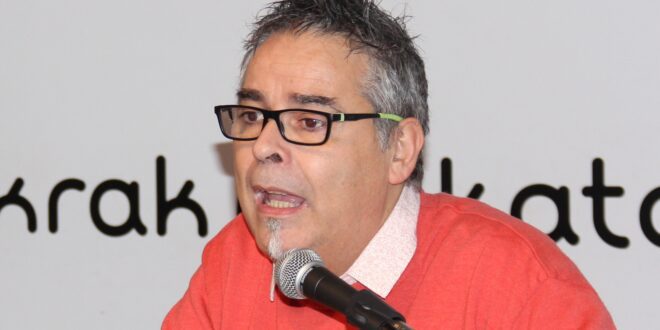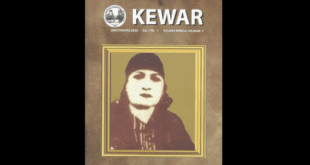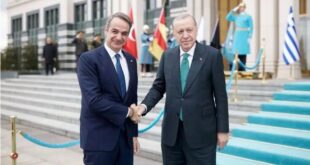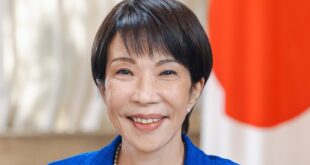Interviewer: Necat Ayaz
We must look at other processes of language revitalization, and in our case we have seen that in the case of Ireland, even with its own state in most of its territory, it has not resolved the language issue. I think this is a very risky option. That is why within the revolutionary discourse we must include the linguistic one. The struggle for the recognition of language rights must be one of the axes in the struggle for the national liberation.
Paul Bilbao Sarria is a well-known Basque language activist who has worked in the field of Basque language revitalization during the last three decades. He was one of the participants of Symposium on Mother Tongue Education in Amed/Diyarbekir in 2014. He had worked more than ten years as General Secretary of Social Council of Basque Language. We have done an interview with Sarria to discuss some controversial issues in the field of struggle for Kurdish language with the light of Basque experience.
Kurdish language activists have been discussing ties between the Kurdish politics and language activism in the last two decades. Some of the activists see two failed attempt to create a language movement under the umbrella of politics as a proof that the area of activism should be autonomous from politics. Some of them claim that without strong support of politics a language movement cannot be successful. As ex-director of Basque language movement, what would you say to these two opposing sides?
All language revitalisation processes are socio-political processes. That is to say, they must have social support and a linguistic policy or political impetus. From our point of view, the language movement must be independent of any political party. Obviously, another issue would be to weave complicities between the social movement and the political movement. In this sense, it is very important that there is a very fluid relationship that joint analyses are carried out… But I believe that the social movement must have sufficient autonomy to make proposals, and sufficient autonomy to make appropriate criticisms. Therefore, the key word between the social movement and the political movement is complicity.
Kurdish movement has never put the linguistic struggle in its main agenda and has considered language as a post-revolution issue. Persons controlling decision making mechanisms of the organizations claim that by having a statute for Kurdistan and with the education in Kurdish, the language question will easily be solved. Comparing this approach to Basque experience what will you say to our political elites?

I believe that we must look at other processes of language revitalization, and in our case we have seen that in the case of Ireland, even with its own state in most of its territory, it has not resolved the language issue. I think this is a very risky option. That is why within the revolutionary discourse we must include the linguistic one. The struggle for the recognition of language rights must be one of the axes in the struggle for national liberation. Of course, the status for the Kurdish and education are axes in its revitalisation, but more is needed. Therefore, the demand for the right to live in the native language must be present. It must be seen as a serious violation of (linguistic) human rights.
The situation of our languages is a direct consequence of the conflict in our territories, that is to say, they are a consequence of those state policies of language minoritisation in which the native linguistic community of the territory has been marginalised. Therefore, when we talk about progress in political terms, we must talk about the right to a language policy without any kind of external interference that respects the community’s decision. And all this discourse must be included in the general discourse. It is impossible for me to conceive of national liberation with language on the sidelines.
Turkish state allowed Kurdish optional classes for secondary schools on the basis of two hours a week in the context of EU reforms in 2012. Kurdish politics rejected this reform with the excuse that it aims to block the way to the mother tongue education and initiated an undeclared boycott against the optional classes in schools. State reform, pro and anti-reform attitudes have since been a major topic of Kurdish society. What do you want to say about this flash point divided the politics and language activists?
I really understand both positions on this issue. It is very clear to me that this opportunity offered by the Turkish state is nothing more than a face-lift to the EU to cover up the glottophobic and totalitarian linguistic policy it is developing towards the Kurdish community. And I would not be surprised, as some Kurdish politicians think, that it is an excuse to close the door on the educational immersion in native language. From that perspective, I understand this call for an undeclared boycott. But, on the other hand, it is also true that this would open up the possibility for students to have some connection with the Kurdish language. I think it is complex, my heart pushes me towards boycotting, and my reasoning pushes me towards taking advantage of the opportunity.
DEM Party’s candidates of Kurdistan towns and cities published a declaration before the local elections of 31st March. The candidates promised to create a language department for each municipality alongside wide range of measures to protect Kurdish language. Given the Basque experience, would you like to suggest some important points to the future mayors of Kurdistan?
First of all, I would like to congratulate you on the declaration. It is important that the commitment to language is explicitly stated. Secondly, you must be aware of the importance of local institutions for citizens, as they are surely the first window to which any citizen turns. Thirdly, I believe that they must plan, even before coming to power, the steps they are going to take to guarantee linguistic rights. A language policy has three axes: legislation, planning and economic resources. In that sense, therefore, they must set the objectives and the steps. In my opinion, the first step will be to make the Kurdish language visible and to provide primary care and attention in that language. From there, short- and medium-term objectives must be defined. Moreover, I think it is essential that they share politics with the social movement, so that they can feel a strong social support.
I believe that we must start by identifying which measures will affect the most people and will be quickest to implement. For example: all the written information, signage… Then which are the departments that work on the most sensitive issues and where language can be more important: social welfare… But, as I said before, the first step is to make the language visible. The Kurdish language community must feel that it is recognised in the local institution.
After top one responsibility of Kontseilua, now you work as director of an Ikastola in Basque Country. What would you like to say to Infowelat’s readers about ikastolas?
The ikastolas are cooperative immersion schools. In other words, the educational centres are owned by the families, and it is the families who decide everything. In our case, it is an Ikastola in one of the provincial capitals with more than 1,200 pupils. Today there are 114 centres in all the territories (Spanish and French states). In contemporary history, ikastolas were created clandestinely under Franco’s dictatorship more than 60 years ago. They have always been pioneers in the field of pedagogy and have been centred on the Basque language and culture. The ikastolas have been and continue to be a determining movement in the process of revitalising the language. They have designed their own educational curricula, and they do not understand borders or the status of the language; they offer the model of immersion in both states, even when Basque is not official.
Photo: Paul Bilbao Sarria
 Infowelat Enformasyon Ji Bo Welat
Infowelat Enformasyon Ji Bo Welat




